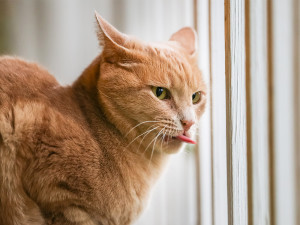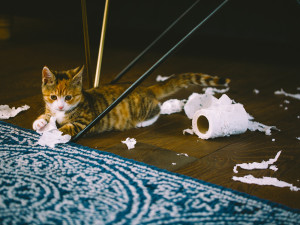Are There Certain Sounds That Cats Hate?
The internet says kitties despise “s” sounds, but it’s a little more complex than that.
Search online for “sounds cats hate,” and you’ll find a bunch of listicles and videos saying more or less the same thing: Cats hate fireworks and vacuums and whistling.(As a cat dad, I could have told you that one.) Anything loud or high-pitched. But do they really hate those sounds or is this just another example of internet misinformation going round and round until it is accepted as fact?
It’s true that cats have exceptional hearing. Better than humans. Better even than dogs. While humans hear in a range of about 64 to 23,000 Hz and dogs 67 to 45,000 Hz, cats can hear sounds as low as 45 Hz and as high as 64,000 Hz (LSUopens in new tab). To put that in perspective, the G7 note opens in new tab that Mariah Carey could hit at the top of her range in the ’90s is about 3,136 Hz.
Save on the litter with color-changing tech that helps you better care for your cat.
A cat’s ears can also swivel and rotate independently, like two little radar dishes, making them incredibly good at picking up sounds in all directions. And their large outer ears are great at picking up higher frequency sounds, like squeaking mice or their own distressed, mewing kittens. They are also terrific at pinpointing exactly where a sound is coming from, which allows them to locate prey in low light.
A cat’s keen hearing also makes it difficult for other larger animals to sneak up and attack them. Because cats in the wild are both predator and prey, they have evolved to be ever vigilant and are ready to flee at a moment’s notice or the slightest unexpected noise. After all, in the wild, when something is unexpected, it is usually dangerous. And any animal that manages to get close to you without you knowing is almost definitely a threat.
How much do you spend on your pet per year?
Cats specifically hate loud sounds they don’t expect.
So, while there are all sorts of stories out there about how much cats hate certain sounds, the truth is a little more complicated. “It’s really about unpredictability and magnitude,” says Dr. Marci Koski, a certified feline behavior and training consultant at Feline Behavior Solutionsopens in new tab.
In other words, a sound has to be surprising and loud for it to actually have an impact. Meaning the sound itself doesn’t really matter. If it did, my friend’s storm-averse cat, Marcell, would have freaked out when I played the soundtrack of a thunderstorm at low volume on his mom’s computer. But he didn’t. He just continued to stare calmly out the window. He turned his ears a little, but he didn’t go running for the closet.
Loudness alone is also not enough to upset most cats. “In our house, we have a big TV with surround sound,” Dr. Koski adds. “And we will be sitting there watching Dune or Star Wars at full volume, and the cats are just snoozing away all around us.”
So, do they want round-the-clock silence, or what?
Cats would probably prefer a quiet house. It‘s less stimulating, and it is harder for something to sneak up on you when it’s quiet, but that doesn’t mean cats are distressed by the presence of noise. Yes, their response when they are startled by a loud noise is more extreme than yours — you jump, while they run for cover — but that sort of behavior is to be expected in a prey animal, and the safer your cat feels in your home, the less likely they are to go running when startled. You can’t predict loud noises in your home or prevent them from happening; it’s just part of the daily life you and your cat has to deal with.
What about vacuum cleaners, though? We’ve all met cats who seem absolutely terrified of the vacuum cleaner, but, according to Dr. Koski, the noises they make, loud and high-pitched as they are, are only part of what makes them so threatening.
“Vacuums are these big things that move forward and back and that sort of movement can be very threatening to a small cat,” she says. But, again, play vacuum cleaner noises quietly on your computer like I did for my friend’s cat, and your cat probably won’t care at all.
It's also unlikely that they care much about the low-level humming of the refrigerator or air conditioner in your home. True, such noises don’t exist in the wild, and cats generally prefer less noise to more, but if you’re worried your cat doesn’t spend time in the kitchen because the hum of the refrigerator is driving them away, don’t.
“Cats generally avoid kitchens because there aren’t a lot of scent absorbers [permeable surfaces] they can leave their scent on or soft places for them to lay down and relax,” Dr. Koski says. “Also, we don’t normally play with them in the kitchen, so there’s really not a lot of reasons for them to be in there.”
So, are there any specific noises that have been proven to upset cats at any volume, even when not surprising? The two vets I reached out to for this article didn’t know of any, but veterinary nurse Gemma Renwick recently told British tabloid The Sunopens in new tab, that cats hate when you make “s” sounds because it’s like you are hissing at them.
“[It’s] almost like swearing at them every time you want their attention,” she said. Dr. Koski disagrees, though. “If what she’s saying was true, then my cat Samantha would pull away every time I said her name, and she doesn’t.”
In the interest of science, I tried making “s” sounds at five different cats in three different friends’ homes, and none of them seemed to care in the slightest. Probably because cats are smart enough to know the difference between a hiss and human “s” sound.
Not to mention, the fact that the cats I tried this on know me well enough to know that I’m not a threat. Certainly not compared to a veterinary nurse, whom they would only see under unusual and stressful circumstances, outside their home, surrounded by the smells and sounds of other distressed animals. This is not to say Renwick is lying about what she observed, only that it seems like there are some conflated variables influencing her conclusions.
In general, try not to surprise your cat.
Context matters. Cats are sensitive creatures with fantastic hearing, but it’s inaccurate to state they don’t like certain noises and leave it at that. Cats, like other animals, including most humans, don’t like being surprised, especially in a threatening way. That’s what scares them — not the noise itself, the surprise. It’s like when people were posting videos of cats reacting to cucumbersopens in new tab being placed behind them.
The cats would jump and hiss and people said it meant that cats were afraid of cucumbers because cucumbers look like snakes. Sure, a cucumber sort of looks like a very short, chubby snake if viewed out of the corner of your eye, but it would be hard to prove that this is what cats are thinking when viewing a cucumber and, according to Dr. Koski, it is much more likely that they were simply reacting to being surprised.
“When cats are eating, they are putting themselves in a position of vulnerability,” Dr. Koski says. “Their face is to the wall, with their backs exposed to the open room, so they are already on high alert. And if they turn around and there is something unexpected there, it’s probably going to freak them out, whether it is a cucumber or not.” Again, it is the surprise that affects them, not the object itself. Just like it is the surprise of some loud noise that gets them all riled up, not the noise itself.
In the end, your cat is going to be just fine.
If you want to do what you can to make your home a quieter space overall, your cat will probably appreciate it. But don’t feel like you have to avoid certain sounds or completely change how you live to accommodate them. If your cat doesn’t like the noise you are making, they will leave the room — just like you would.
As long as they have a nice quiet place to retreat to, they’ll be fine. They’re sensitive, but they’re not made of glass. They can handle the occasional loud surprise. They might not like it, but as long as you aren’t doing it on purpose in an attempt to get views on YouTube, it’s just part of being alive in the world. They’ll be fine, so try not to worry about it.












